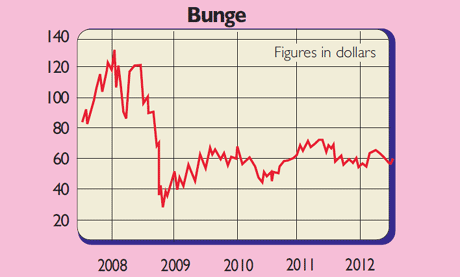Get the latest financial news, insights and expert analysis from our award-winning MoneyWeek team, to help you understand what really matters when it comes to your finances.
You are now subscribed
Your newsletter sign-up was successful
Want to add more newsletters?

Twice daily
MoneyWeek
Get the latest financial news, insights and expert analysis from our award-winning MoneyWeek team, to help you understand what really matters when it comes to your finances.

Four times a week
Look After My Bills
Sign up to our free money-saving newsletter, filled with the latest news and expert advice to help you find the best tips and deals for managing your bills. Start saving today!
America's Midwest is suffering a heatwave that has caused the worst drought for 24 years and is threatening the nation's crops. Corn prices are surging and the shares of US grain processors have plunged. This spike in input costs should be treated as an opportunity for investors. The world's population of seven billion is forecast to exceed nine billion by 2050. That will see demand rising by 70%.
Meanwhile, topsoil erosion, climate change and a lack of irrigation are restricting the availability of arable land. Throw in escalating demand from biofuels, and the world could face a supply crunch. I think the recent pullback in the shares of agricultural giant Bunge offers a good entry point for patient investors.
The group buys, sells, stores, transports and processes oilseeds, grains, sugarcane, biofuels and wheat. It also produces fertilisers and animal feed. Its operations span established powerhouses like the US and rapidly expanding parts of eastern Europe and Asia.
MoneyWeek
Subscribe to MoneyWeek today and get your first six magazine issues absolutely FREE

Sign up to Money Morning
Don't miss the latest investment and personal finances news, market analysis, plus money-saving tips with our free twice-daily newsletter
Don't miss the latest investment and personal finances news, market analysis, plus money-saving tips with our free twice-daily newsletter
This global offering is enhanced by first-class storage, milling and transport facilities. Bunge manages eight sugarcane mills in Brazil. These are equipped to produce renewable electricity from ethanol that can be diverted to the national grid. Over time, power generation could generate 20% of the division's profits, providing both a source of growth and greater diversification.
Bunge (NYSE: BG), rated a BUY by Feltl and Company

Wall Street expects 2012 turnover and underlying earnings per share (EPS) of $62.7bn and $6.54 respectively, rising to $66.4bn and $7.29 in 12 months time. That puts the stock on a miserly price/earnings (p/e) ratio of less than ten. I rate the stock on a nine times earnings before interest, tax, depreciation and amortisation (EBITDA) multiple. Adjusting for $690m of preference shares and $4bn of net debt generates an intrinsic worth of around $75 per share.
Risks include volatile prices, increasing competition, geopolitical fears, foreign currency fluctuations and possible trade protectionism. Nonetheless, the long-term fundamentals are very positive. The company also offers a sound hedge against inflation in the event that quantitative easing spirals out of control. Feltl has a target price of $82, and the next quarterly earnings are due out on Wednesday 25 July.
Rating: BUY at $61.20
Paul Hill also writes a weekly share-tipping newsletter, Precision Guided Investments. See www.moneyweek.com/PGI or phone 020-7633 3634.
Get the latest financial news, insights and expert analysis from our award-winning MoneyWeek team, to help you understand what really matters when it comes to your finances.
Paul gained a degree in electrical engineering and went on to qualify as a chartered management accountant. He has extensive corporate finance and investment experience and is a member of the Securities Institute.
Over the past 16 years Paul has held top-level financial management and M&A roles for blue-chip companies such as O2, GKN and Unilever. He is now director of his own capital investment and consultancy firm, PMH Capital Limited.
Paul is an expert at analysing companies in new, fast-growing markets, and is an extremely shrewd stock-picker.
-
 Should you buy an active ETF?
Should you buy an active ETF?ETFs are often mischaracterised as passive products, but they can be a convenient way to add active management to your portfolio
-
 Power up your pension before 5 April – easy ways to save before the tax year end
Power up your pension before 5 April – easy ways to save before the tax year endWith the end of the tax year looming, pension savers currently have a window to review and maximise what’s going into their retirement funds – we look at how